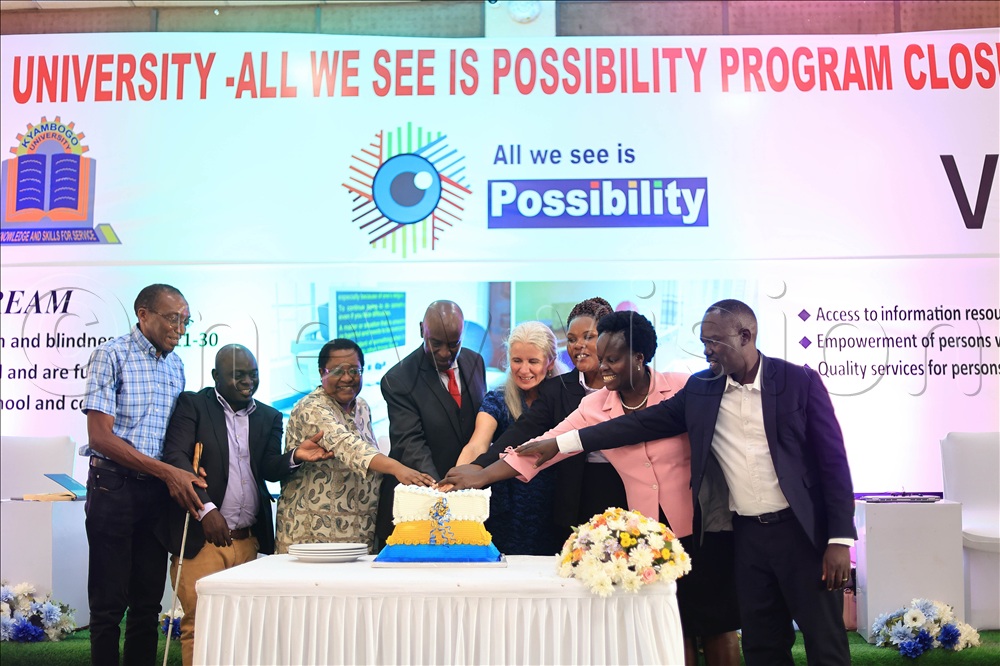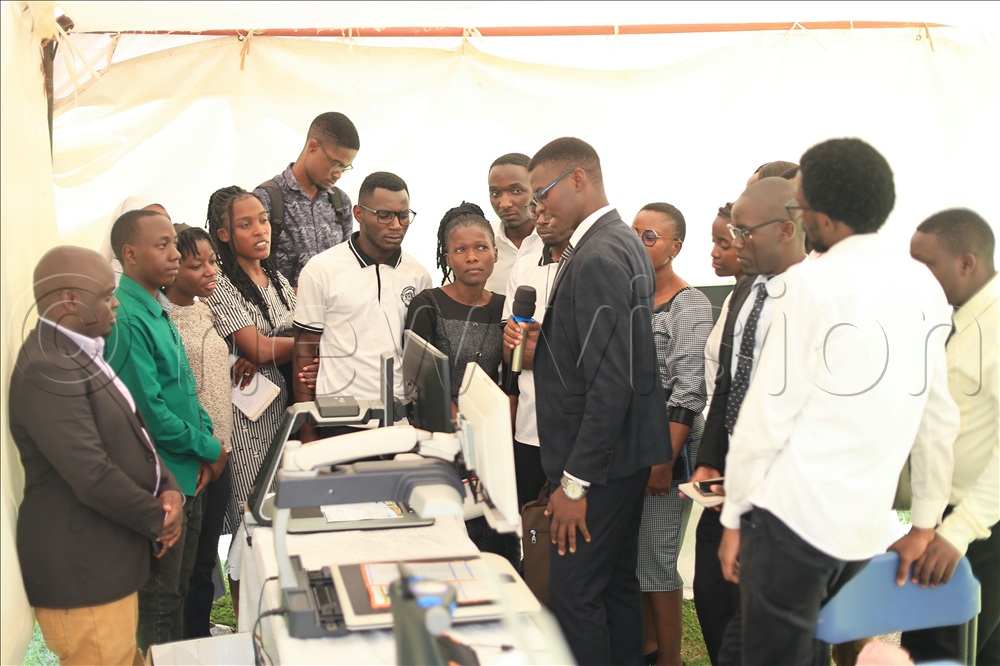Visually impaired learners ask govt for learning gadgets, trained teachers
“We want government to continue providing assistive devices, recruit teachers and provide eye care services for learners with low vision and the blind,” Aceng said.
Officials from All We See is Possibility, Kyambogo University and pupils of Salama school of the blind pose for a photo during the program closure event. (Photos by Agnes Kyotalengerire)
_______________
Students with visual impairment have appealed to the government to provide assistive devices and adequately trained teachers to support their learning.
Assistive technology refers to any item, software or equipment that increases, maintains or improves the functional capabilities of individuals with disabilities. These range from low-tech tools such as pencil grips and magnifying glasses to advanced options such as screen readers, speech-generating devices and wheelchairs.
Joy Mercy Aceng, a visually impaired student from Gulu High School, said that providing scholastic materials and the necessary resources is essential for creating an inclusive and engaging environment for learners who are blind or have low vision.

Officials from All We See is Possibility and Kyambogo University cutting cake during the program closure event.
Aceng also noted that distributing assistive devices without trained instructors limits their effectiveness.
“We want government to continue providing assistive devices, recruit teachers and provide eye care services for learners with low vision and the blind,” she said.
She emphasised the need for sensitisation and awareness among learners, teachers and all stakeholders involved in supporting children with visual impairment.
Jimmy Patrick Okello, a teacher of learners with visual impairment, agreed. He said that conducting thorough needs assessments is important in determining which assistive devices suit different learners, including those who are totally blind, those who see very little and those who have partial vision.
Some learners require Orbit Readers, others prefer audio devices, while some may need a Perkins Brailler. The Orbit Reader 20 functions as a braille display, book reader and note-taker and can connect to computers or phones via USB or Bluetooth.
According to Okello, such assessments ensure that no learner is left behind and help align support to individual study needs.
Dr Odette Ninyisabwa Tumwesigye, head of the department of visual impairment in the Faculty of Special Needs and Rehabilitation at Kyambogo University, said faculties and departments across schools and universities must work together to enable learners with visual impairment to succeed.
“Providing access to essential assistive technologies such as screen readers, magnifiers is very critical in inclusion of learners with visual impairment,” Dr Odette noted.
She said offering comprehensive training to students on how to use these devices is equally important.
Dr Paul Emong, head of disability support at Kyambogo University, said schools and universities should work closely with organisations of and for persons with disabilities, and with government, to equip resource centres with the necessary assistive devices for learners with disabilities.

Student explains how the assistive devices work and looking on is Kyebagadha Binasali who is the program technical officer All we see is possibility.
“Without adapting information into accessible formats, there is no way a student with visual impairment can learn,” Dr Emong noted.
According to Sarah Bugoosi Kiboli, commissioner for special needs and inclusive education at the Ministry of Education and Sports, the government purchases and distributes assistive devices to schools each year.
She said the Ministry also builds the capacity of teachers and provides them with the required instructional materials. The Ministry of Health is responsible for screening children.
The remarks were made on November 13, 2025, during the closing ceremony of the “All We See Is Possibility Programme” at Kyambogo University.
The programme, started by Visio in 2016 together with Kyambogo University’s Faculty of Special Needs and Rehabilitation, aims to enhance the quality of support for young people with low vision and blindness.
According to programme manager Petra Winjen, the initiative benefits young people aged 11 to 30 by helping them develop their full potential and ensuring they are included in society at home, at school and in their communities. The programme seeks to support them to lead independent and dignified lives with equal opportunities.
Dr Peace Tumuheki, dean of the Faculty of Special Needs and Rehabilitation at Kyambogo University, said the programme has made a significant impact by focusing on empowerment, quality, accessibility and affordability.
She said it has benefited thousands of individuals and institutions across Uganda.
Programme coordinator William Obella said the initiative has greatly improved access for young people with visual impairment. Assistive technology resource rooms have been established in 32 schools, and 14 hospitals have been equipped with eye-screening and assessment kits. Kyambogo University and Makerere University are among the beneficiaries.
Obella urged Kyambogo University to recruit an ophthalmologist to ensure the kits are fully utilised for the benefit of students with low vision or blindness and the surrounding community.
He added that the programme has developed modules to train professionals in visual impairment support.
According to technical officer Kyebagadha Binasali, more than 1,000 professionals have been trained and over 2,000 learners with visual impairments have directly benefited through improved access to education, assistive technology and greater participation in school and community life.
Dr Tumuheki said the interventions have improved educational outcomes while promoting dignity, independence and participation.
“Let us continue to see possibilities in every learner, every community and every challenge and transform them into opportunities for empowerment, growth and lasting change,” she said.
Kyambogo University vice chancellor Prof. Eli Katunguka Rwakishaya said the partnership has significantly improved the lives of many young people.
“It was amazing to see that the project could empower young people by giving them confidence to believe that life can be good even when they cannot see, when their vision is low or when they are totally blind,” Prof. Katunguka noted.